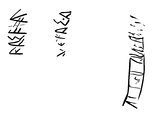AK-2.2
| Inscription | |
|---|---|
| Transliteration: | ]???ạs·a |
| Original script: | ]??? |
|
| |
| Object: | AK-2 rock (stone) (Inscriptions: AK-2.1, AK-2.2, AK-2.3) |
| Position: | top, left |
| Orientation: | 90° |
| Frame: | |
| Script: | North Italic script (Magrè alphabet) |
| Direction of writing: | dextroverse |
| Letter height: | 8 cm |
| Number of letters: | 6 |
| Number of characters: | 7 |
| Number of lines: | 1 |
| Craftsmanship: | engraved |
| Current condition: | damaged |
| Date of inscription: | |
| Date derived from: | |
|
| |
| Type: | prob. votive |
| Language: | unknown |
| Meaning: | unknown |
|
| |
| Alternative sigla: | TM 653515 |
Images
|
Inscription AK-2.2.
|
| |||
|
Inscription AK-2.2.
|
Commentary
Not previously published. Examined by TIR in June 2015.
Image in Mandl 2011: Abb. 144 (photo).
Length min. 30 cm; running upwards on the upper part of the rock wall, left of the centre (Bildstelle 1).
The only unambiguously legible characters are ![]()
![]()
![]() . A deep mark of doubtful relevance in the form of a short vertical line is situated in the upper area after
. A deep mark of doubtful relevance in the form of a short vertical line is situated in the upper area after ![]() . Before
. Before ![]() , a triangle-shape which is best interpreted as another
, a triangle-shape which is best interpreted as another ![]() ; before this, a multi-branched character (see drawing) which might possibly be read
; before this, a multi-branched character (see drawing) which might possibly be read ![]() or
or ![]() . Before that, at least two more illegible characters (see drawing); then, a horizontal crack along the rock face. No traces of an inscription can be made out below it. A slightly curving frame line can be seen below the characters.
. Before that, at least two more illegible characters (see drawing); then, a horizontal crack along the rock face. No traces of an inscription can be made out below it. A slightly curving frame line can be seen below the characters.
Within the corpus of rock inscriptions, the present inscription can be compared with the type-2 petrographs– cf., on the same rock wall, AK-2.1, as well as AK-1.10, AK-1.11 and AK-1.17, which are all dextroverse and feature sigma with four strokes, and at Steinberg sinistroverse ST-5 and ST-6, also with ![]() ; see Raetic epigraphy. Of these, AK-1.11 and the two Steinberg inscriptions have punctuation marks. Cf. especially AK-1.11 ending in -kas?.
; see Raetic epigraphy. Of these, AK-1.11 and the two Steinberg inscriptions have punctuation marks. Cf. especially AK-1.11 ending in -kas?.
Bibliography
| Mandl 2011 | Franz Mandl, Felsbilder. Österreich – Bayern: Nördliche Kalkalpen [= Anisa – Verein für alpine Forschung 4], Haus im Ennstal: 2011. |
|---|






